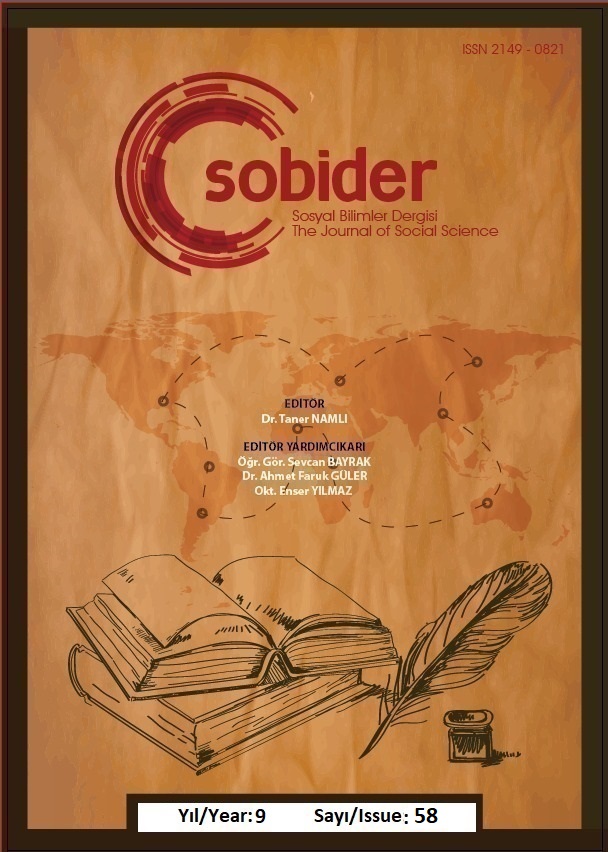Author :
Abstract
İlerleyen teknoloji ve ilmi çalışmalar günümüzde insanları birtakım yeniliklerle ve yeni durumlarla karşılaştırmaktadır. Hukuk alanında da bu gelişmeler doğrultusunda araştırmalara ve çalışmalara ihtiyaç duyulmaktadır. Bu durumlardan bir tanesi de internet kullanımının getirdiği dijital bilgilerin konumu ve değerlendirilmesi hususudur. Yaşadığımız asır internet çağı olduğundan artık insanlar çoğu bilgilerini internette paylaşmakta ve çoğu işlerini internet üzerinden gerçekleştirmektedir. Dijital bilgilerin kendisinde toplandığı internet ortamı değer ifade eden veya etmeyen bir çok bilgi ve hesapları içinde barındırmaktadır. Bu bağlamda dijital bilgilerin İslâm miras hukukunda terike kapsamında değerlendirilip değerlendirilmeyeceği problemi ortaya çıkmış ve inceleme konusu olmuştur. Murisin ölmesi halinde elektronik postaları ve sosyal medya hesapları gibi dijital bilgilerinin mirasçılarına intikal edip etmeyeceği meselesi yeni bir durum olarak gündeme gelmiştir. Bu gibi dijital bilgilerin İslâm miras hukuku açısından da akıbetinin ne olacağının incelenmesi gerekmektedir. Konu ile alakalı düzenlemeler günümüz hukuk sistemlerinde de yeterli derecede olmadığı için yeri geldiği zaman bu mesele tartışma konusu olmaktadır. Esasen dijital bilgilerin durumu sadece miras hukukunu ilgilendiren bir problem olmayıp daha farklı açılardan da ele alınıp incelenmesi gereken bir konudur. Mesela: kişiye ait özel bilgilerin durumu, haberleşmenin gizliliğinin korunması, matewors’un konumu v.b hususlarda bu alanda ele alınması gereken konuların başında gelmektedir. Ancak bizim çalışmamızda çağımızın ortaya çıkardığı dijital mirasın konumu ile ilgili durum İslâm hukuku açısından değerlendirilecektir.
Keywords
Abstract
Today, the advancement of technology and scientific studies compare people with some innovations and new situations. One of these situations is the evaluation of digital information brought about by internet use. Since the century we live in is the internet age, people now share most of their information on the internet and most of their work is done on the internet. The internet environment, in which digital information is collected, contains many information and accounts that are valuable or not. In this context, it has been a matter of debate whether digital information will be considered within the scope of terike in Islamic inheritance law. The issue of whether digital information such as e-mails and social media accounts will be passed on to the heirs of the deceased in the event of his death, is a new situation and needs to be examined. It is necessary to examine what will be the fate of such digital information in terms of Islamic inheritance law. Since the regulations related to the subject are not sufficient in today's legal systems, this issue becomes the subject of discussion when appropriate. The status of digital information is not only controversial in terms of inheritance law, but also from different perspectives. For example: it is related to many different issues such as the status of private information belonging to the person, the protection of the confidentiality of communication. In this study, the position of digital heritage will be evaluated in terms of Islamic law.
Keywords
- Ahmed b. Hanbel, Ebû Abdillâh Ahmed b. Muhammed b. Hanbel eş-Şeybânî, el-Müsned, Müessetü’r-Risâle, Beyrut 2001.
- Büceyremî, Süleyman b. Muhammed b. Ömer, Tuhfetu’l- habib ala şerhi’l hatib (Hâşiyetu’l- Büceyremî), Dâru’l-Fikr, Beyrut 1995.
- Derdîr, Ahmed b. Muhammed, eş-Şerhu’l kebîr ala muhtasarı halîl, Dâru’l-Fikr, Beyrut (t.y). Ebu İshâk İbrahim b. Musa b. Muhammed eş-Şâtibi, el-Muvafakât, Dâru İbni Affân, Kâhire 1997,1/31.
- Döndüren, Hamdi,Ticaret ve İktisat İlmihali, Erkam Yayınları, İstanbul 1993.
- Haase, Martin Sebastian, “Rechtsfragen des Digitalen Nachlasses“ Law as a Service (LaaS) Recht im Internet –und Cloud-Zeitalter, Band 1, Jürgen Taeger (Hrgs), Oldenburger Verlag für Wirtschaft, Informatik und Recht,Edewecht 2013. Hafif, Ali, el-Milkiyyetu fiş’şerîati-l islâmiyye, Dâru’l Fikri’l Arabî, Kâhire 1996. Hâkim, Ebu Abdillah Muhammed b. Abdillah b. Muhammed b. Hamdeveyh et-Tahmânî enNeysâbûrî, el-Müstedrek ala’s-sahihayn, Dâru’l Kütübi-l İlmiyye, Beyrut 1990.
- İbn Âbidîn, Muhammed Emin, Raddu’l-muhtâr, Dâru-l Fikr, Beyrut 1992.
- İbn Manzûr, Muhammed b. Mükerrem; Lisânu’l-Arab, Daru Sâdır, Beyrut 1990.
- İmre, Zahit ve Erman, Hasan, Miras Hukuku, Der Yayınları, İstanbul 2017.
- Kadri Paşa, Muhammed, Mürşidu’l hayrân ila marifeti ahvâli’l insan, Bulak matbaası, Mısır Kalay, Şerafeddin, İlim ve Hikmet Pınarından Ticaret Ehline, Safa Yayın Dağıtım, İstanbul Kâsânî, Alauddin Ebû Bekr b. Mesud, Bedâi‘u’s-sanâi‘ fî tertibi’ş-şerâi‘, Dâru-l Kütübi-l İlmiyye, Beyrut 1986. Keşkî, Muhammed Abdurrahim, et-Teriketu ve ma yetealleku biha mine’l-hukuk, Dâru’nNezîr (t.y). İlmi komisyon, , Mecelletü’l ahkâmi’l adliyye, Karhane-i Ticareti Kütüb, Karataşi (t.y). Mevsilî, Abdullah b. Muhammed b. Mevdûd Mecdüddin, el-İhtiyâr li-ta’lili-l muhtâr, Dâru-l Erkam, Beyrut (t.y.). Müslim b. Haccac, Ebu’l-Hüseyn, el-Câmiu's-Sahih, Dâru İhyai’t-Türasi’l-Arabi, Beyrut (t.y), Thk: Muhammed Fuad Abdulbakî. Rahîbânî, Mustafa b. Sad b. Abdihi, Metâlibu uli’n-nuhâ fi şerhi ğâyeti’l- münteha, elMektebu’l-İslâmî 1994. Ramlî, Şemsuddin Muhammed b. Ebi’l Abbas Ahmed b. Hamza Şihabuddin, Nihâyetu’l muhtaç ila şerhi’l minhac, Dâru’l-Fikr, Beyrut 1984. Savî, Ahmet b. Muhammed el-Malikî, Bülğatü’s-salik li’ekrabi-l mesalik ila mezhebi’l imamı malik (Hâşiyetus-sâvî ala’ş-şerhi’s-sağîr),Mektebetu Mustafa el-Bâbî el-Halebî, Halep
- Tosun, Nihat, Ticaret hukuku, Safa Yayın Dağıtım, 1. baskı İstanbul 2019.
- Zerka, Mustafa Ahmet, el-Medhalu’l- Fıkhiyyü’l- Amm, Dâru’l-Kalem, Dimeşk 2012.





